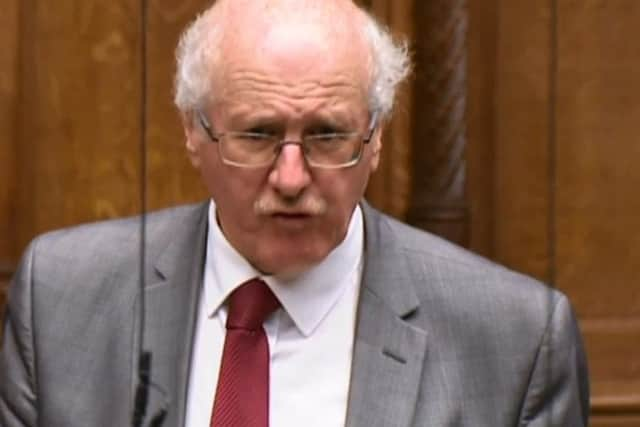DUP MP: We would be open to considering time-limited backstop
and live on Freeview channel 276
The thorny issue of the Irish border backstop has proven to the major blockage to progress in the Brexit talks between London and Brussels, with the prime minister’s allies in government the DUP fiercely opposed to its inclusion in the Withdrawal Agreement.
The party has consistently said the proposal must be jettisoned if it is to back any deal negotiated by Theresa May.
Advertisement
Hide AdAdvertisement
Hide AdHowever, the DUP’s Jim Shannon has signalled that, if the EU was willing to concede that the backstop would be time-limited to one or two years, that may be sufficient to win his party’s backing.


Crucially, the Strangford MP said an expiry date on the backstop must come into effect before the UK’s next scheduled general election.
Under the terms of the Fixed-term Parliaments Act – which provides that parliamentary general elections take place every five years on the first Thursday in May – the next general election is due to take place on May 5, 2022.
When asked if a time-limit on the backstop, agreed by both the EU and UK in a legally-binding withdrawal agreement, would be enough to assuage the fears of DUP MPs, Mr Shannon told the News Letter: “We have considered that and if the time-scale was one year, or perhaps even two, certainly within this term of government, I think we would certainly look at that as an option.
Advertisement
Hide AdAdvertisement
Hide Ad“In any deal, a time-limit to the backstop has to be within this term of government so that we can control it.”
Ahead of the historic Brexit vote on Tuesday, the DUP chose not to support a number of amendments designed to reshape Mrs May’s deal and be more palatable to Brexiteers.
Among them were two tabled by Tory backbenchers, which sought to address the issue of the backstop.
An amendment by John Baron, MP for Basildon and Billericay, stipulated that the UK would have the right to terminate the backstop without the agreement of the EU.
Advertisement
Hide AdAdvertisement
Hide AdAnother tabled by Sir Edward Leigh, MP for Gainsborough, aimed to limit the scope of the backstop by giving the assurance that, if it doesn’t end by the close of 2021, it would result in the termination of the withdrawal treaty.
DUP Brexit spokesperson Sammy Wilson told the News Letter on Tuesday that there was no amendment that could have been made that would have persuaded his party to back Mrs May’s controversial deal.
The East Antrim MP added: “The problem with all of these amendments is that it would be a commitment made by one party, ie, the British government. The only part which has been agreed by both the UK and the EU is the withdrawal agreement itself, and so that is the part that would be legally binding.”
Mr Wilson also previously told this newspaper that the government could write its pledge to end the backstop within a year “in blood” and it would still not be enough for his party.
Advertisement
Hide AdAdvertisement
Hide AdHowever, Mr Shannon’s comments appear to indicate that, if a time-limit to the backstop was written into the Withdrawal Agreement – a legally-binding international treaty – it could be enough to bring the DUP on board.
Mr Shannon added that, by backing Mrs May in yesterday’s confidence vote in the House of Common’s, the DUP aimed to “strengthen her hand in negotiations with the EU to find a better deal”.
“She claims to be a proud unionist. This is her chance to prove it by standing up for unionism and ensure there is no constitutional change for NI within the UK,” he said.
Mr Shannon said he was surprised by the scale of Mrs May’s defeat in the Commons on Tuesday, and felt that by delaying the vote on her deal from its original date in December, the PM actually increased the margin of her defeat.
He added: “The longer she delayed, the more time MPs had to think about her deal and became more and more unhappy with Mrs May’s strategy.
“It was a calculated risk that she got spectacularly wrong.”